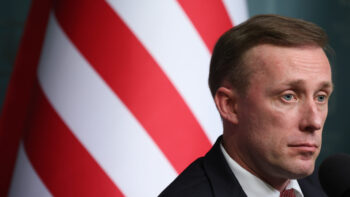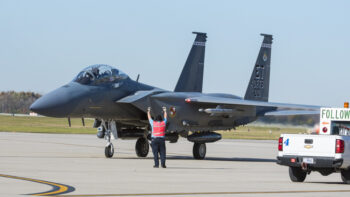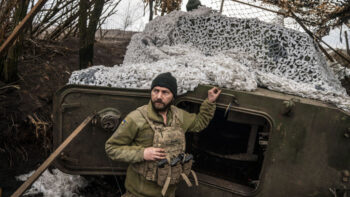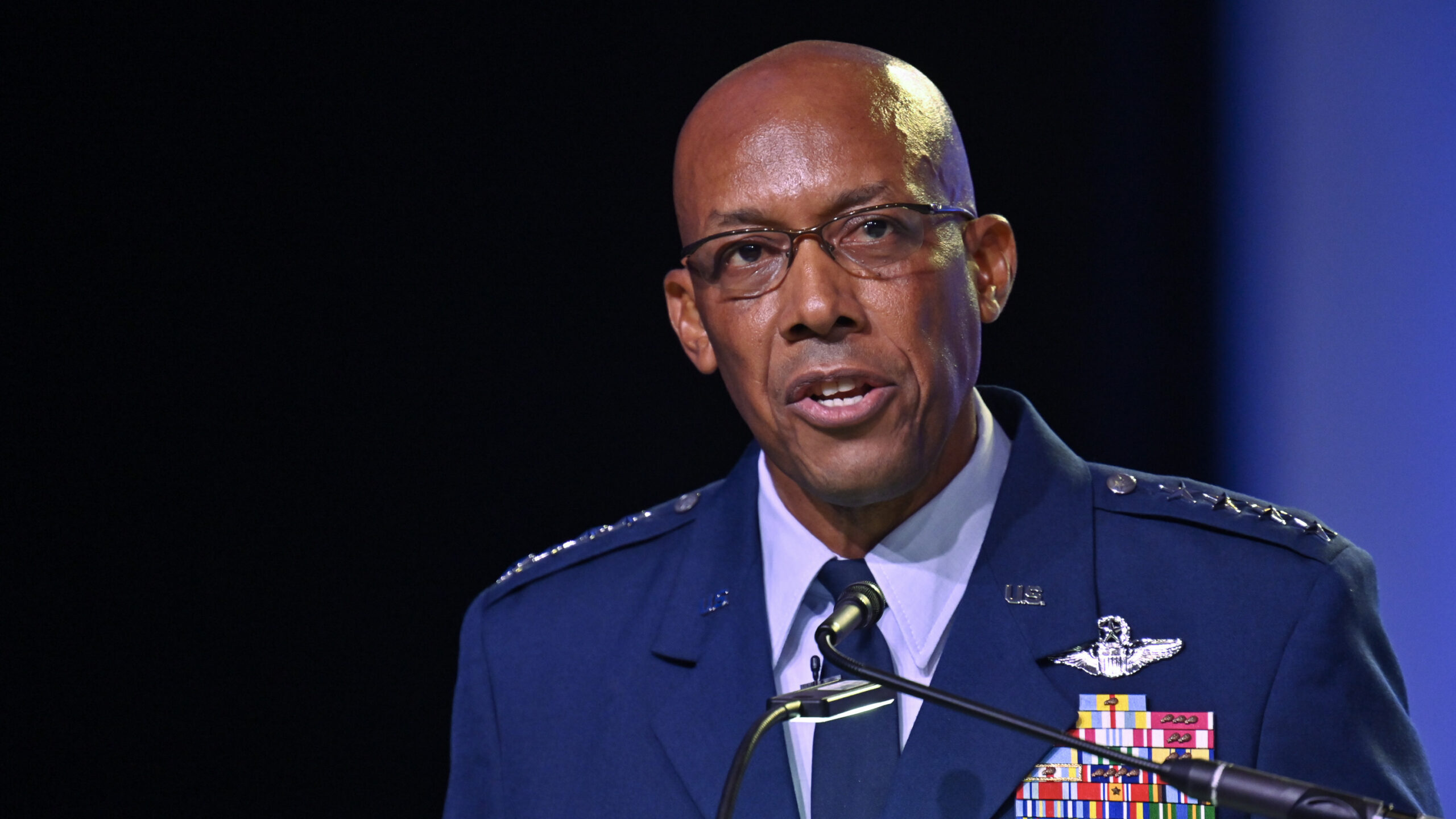
Air Force Chief of Staff Gen. CQ Brown delivers a speech during the 2021 Air Force Association Air, Space and Cyber Conference in National Harbor, Md. (USAF/Eric Dietrich)
WASHINGTON — Army Gen. Mark Milley formally slid the Joint Chiefs of Staff chairmanship job over to Air Force Gen. CQ Brown today, and with it, a series of headaches he may well be glad to be done with.
Among the challenges facing Brown as soon as he sits down at his new desk: a looming government shutdown in less than two days, a Congress that suddenly seems unable to pass Ukraine support, and a country more partisan about the role of the Chairman of the Joint Chiefs than ever before.
“And as Commander in Chief, I relied on Mark’s counsel, because I know he always gives it to me straight no matter what,” President Joe Biden said during the formal change ceremony on Joint Base Myer-Henderson Hall in Virginia.
“Like Gen. Milley, Gen. Brown is a patriot through and through, sworn to uphold and defend the Constitution… [and] I look forward to working even more closely with you, CQ,” Biden later said.
The four-star Army general is retiring after 43 years in service, including a stint as the Army Chief of Staff followed by his time as chairman. He exits with a unique place in history, having served President Donald Trump during the Jan. 6, 2021, attack on the US Capitol and then President Joe Biden during the military’s tumultuous Afghanistan exit and Russia’s 2022 invasion of Ukraine.
He may well be best remembered for his time under Trump, which led him to be reviled first by Democrats who felt he was too obsequious to Trump, and then Republicans who viewed him as undermining the president. Trump himself made it clear he has no love for Milley, saying just days ago that the general committed treason “so egregious that, in times gone by, the punishment would have been DEATH.” (Even in his way out, Milley couldn’t avoid getting dragged into politics, with Biden on Thursday slamming Trump’s comments at a political event.)
Milley seemed to nod towards those events in his remarks today at his formal exit ceremony.
“We don’t take an oath to a country. We don’t take an oath to a tribe. We don’t take an oath to a religion. We don’t take an oath to a king, or queen, or tyrant, or dictator. And, we don’t take an oath to a wannabe dictator: We don’t take an oath to an individual,” Milley said, as Biden and Brown both looked on. “We take an oath to the Constitution and we take an oath to the idea that as [Americans], we’re willing to die to protect it.
As Milley steps into civilian life, Brown is stepping forward and bringing with him almost four decades of military experience including his time as a fighter pilot, commander of the 31st Fighter Wing, Central Command’s deputy commander, head of US Air Forces in the Pacific, and service chief.
RELATED: CQ Brown is Biden’s pick for next Chairman of the Joint Chiefs – here’s how he might approach the role
Today’s ceremony almost didn’t happen due to Alabama Republican Sen. Tommy Tuberville’s blanket hold on chamber floor votes for senior military appointees. But, last week Senate Majority Leader Chuck Schumer, D-NY, announced the legislative body would hold individual floor votes on three nominees — Brown, and newly sworn in Army Chief Gen. Randy George and Marine Corps Commandant Gen. Eric Smith. Brown received an 83-11 vote in favor of his nomination.
The Air Force four-star general is taking the chairmanship reins with a set of hurdles looming in front of him.
“Gen. Brown is stepping into the chairman’s post at a momentous time,” Sen. Jack Reed, Chairman of the Senate Armed Services Committee, wrote in a short statement to Breaking Defense. “He will need to navigate a dangerous global security environment that grows more complex by the day, particularly with regard to China and Russia.”
Challenges And ‘Toothaches’
As Brown steps into the post as the 21st Chairman of the Joint Chiefs of Staff, the Biden administration’s National Defense Strategy and its decision to focus on the Indo-Pacific region has been in place for years. However, a variety of challenges and question marks still await Brown about Ukraine, a possible government shutdown, and the US Southern border, according to two analysts.
Mark Cancian, a senior advisor with the Center for Strategic and International Studies’ International Security Program, spoke with Breaking Defense on Thursday and broke four challenges into two buckets. The most critical bucket, he said: securing funding for both the department and Ukraine.
“His bigger problem is first, Ukraine, because if the funding doesn’t come through…then there’s a huge problem. What do we do? How do we support Ukraine?” Cancian said. And if lawmakers do greenlight additional funding to support Ukraine’s military, Brown will need to advise Biden on ways to continue sending weapons to the Eastern European nation while US stockpiles dwindle, he added.
“Ukraine is going to be a problem really, either way,” Cancian said.
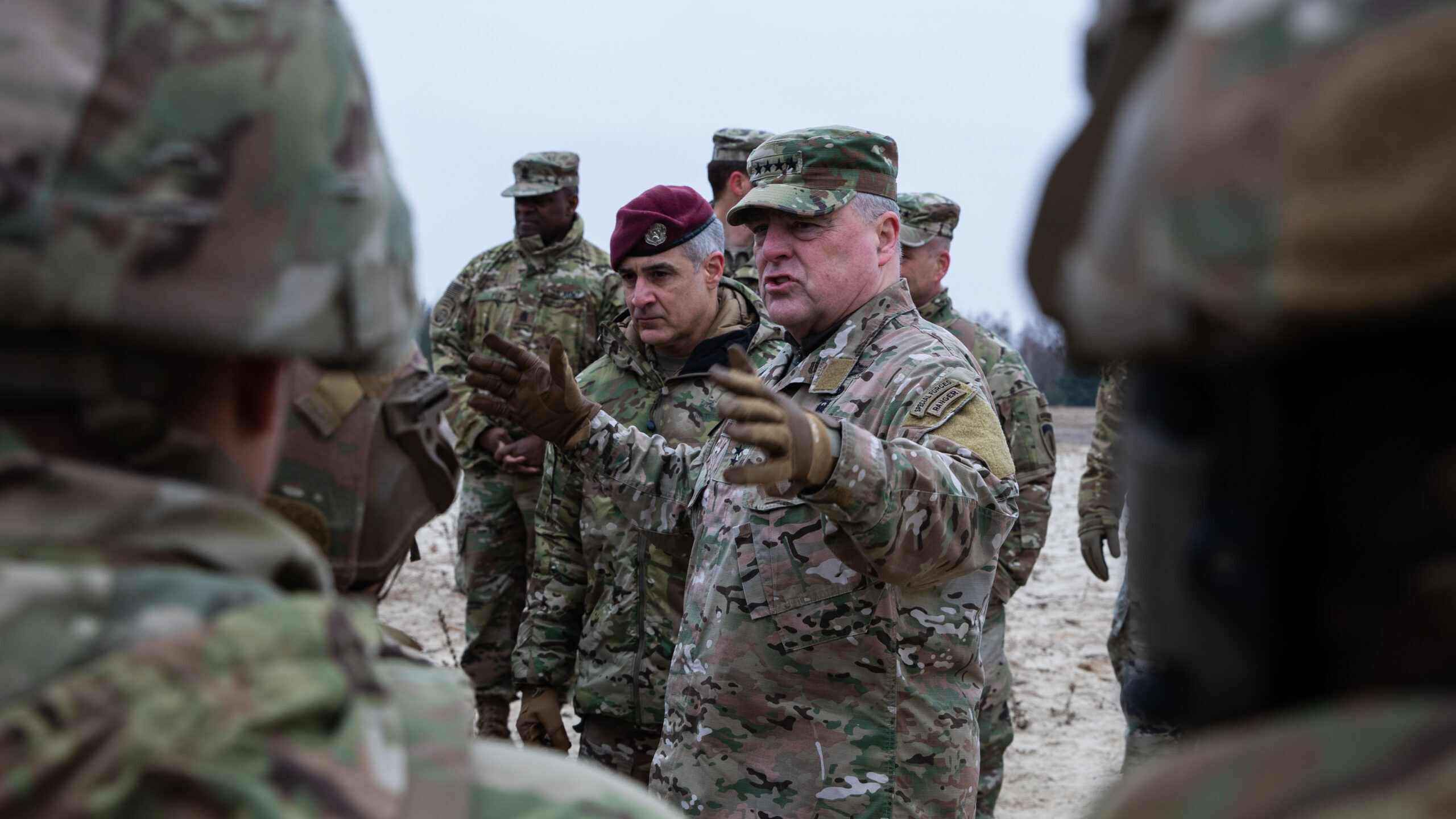
U.S. Army Gen. Mark Milley, the Chairman of the Joint Chiefs of Staff, speak with Paratroopers from the 82nd Airborne Division during a visit to Nowa Deba, Poland, March 4, 2022. (U.S. Army Photo by Master Sgt. Alexander Burnett)
Micheal O’Hanlon, a senior fellow and director of research in foreign policy at the Brookings Institution, agreed that Ukraine funding will likely emerge as a top challenge for Brown — and based on Congressional action this week, it will become an intense issue sooner than anticipated. Brown’s biggest role, O’Hanlon said, will likely be messaging why the US should continue to support Kyiv’s resistance to Russia.
“He’s going to have to think about how do you make a meaningful case to Republican skeptics about why continuing aid to Ukraine could turn the battlefield around next year, even if it hasn’t this year,” O’Hanlon told Breaking Defense on Thursday. Part of that messaging, he said, will include ways to make sure Ukraine survives as a country even if it is unable to liberate more land from Russian occupation.
“In other words, what’s the fallback strategy that still keeps Ukraine strong, sovereign and safe,” O’Hanlon said.
Ukraine aside, Cancian said he believes Brown’s second “big” challenge involves the defense budget at a time of inflation and a push by some Republicans to cut government spending. That includes coordinating among the services, who are all working to field a slew of new weapons and technologies to better position the US military to fight in the Indo-Pacific theater, in order to ensure the right balance between fielding costly new capabilities and sustaining legacy ones.
In Cancian’s bucket of less critical items facing the new chairman is the looming government shutdown that could begin on Sunday and Tuberville’s hold on hundreds of DoD nominees.
“The shutdown is just an annoyance,” said Cancian, who noted that although a sizable portion of the DoD civilian workforce will be home, the first two weeks this will largely be a headache for lawyers, the comptroller, and the congressional liaison staff.
“Tuberville…. is like a toothache, you know, it’s not gonna kill you but it just never goes away,” he added in reference to the backlog of appointees awaiting votes on the Senate floor.
From his vantage point, O’Hanlon cited two issues “bubbling and intensifying” that Brown will likely need to address during his tenure — the military’s recruiting problems and the crisis at the US southern border.
On the former, O’Hanlon said at some point senior military leaders and the White House will need to consider the recruiting shortfalls as a “crisis” of the all-volunteer force that may require more incentives or will people start talking about a draft. “There are some people in the Pentagon who are worried very acutely about it, but it hasn’t really risen to a high-level political issue, and it probably should,” he added.
O’Hanlon also cited US southern border security and the opioid problem, as a mushrooming issue for Brown and one ripe for DoD to potentially play a larger role.
“It’s not just Donald Trump, who is throwing ideas out there, that would have sounded crazy 10 or 20 years ago: It’s going to be more and more people,” O’Hanlon said, referring to reports that the former president wanted to launch attacks on drug labs inside Mexico.
“Even though [border options are] not something he should be speaking about publicly…he’s got to have thought through what roles DoD could play in a support capacity and what role DoD should not play because there’s going to be a lot more conversation around this issue.”
Sullivan: Defense industry ‘still underestimating’ global need for munitions
National Security Advisor Jake Sullivan said that there are “no plans” for another Ukraine supplemental at this point.
















